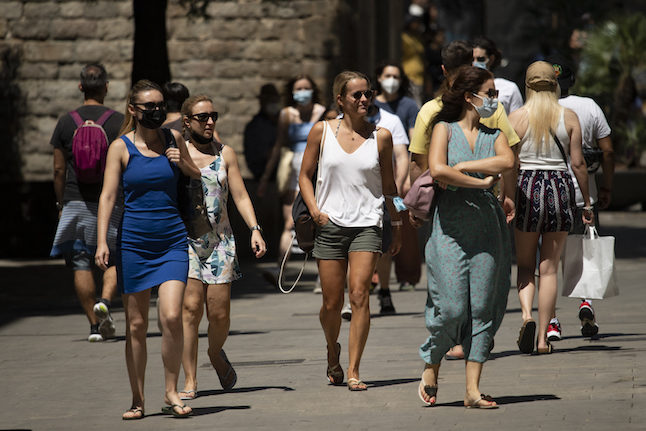It’s been a legal requirement to wear a mask in the open air for just over a year, with offenders risking a fine, but in Madrid’s Puerta del Sol Square, few could be seen with their faces uncovered.
“I really like walking around and I sweat a lot so for me, taking off the mask is a pleasure,” smiles 76-year-old Antonia Maldonado.
She and her husband, both in their 70s, are among the few people walking through the busy square without masks under a cloudless blue sky.
Masks first became obligatory on public transport in early May 2020 in a bid to reduce Covid-19 infections, and within weeks were made compulsory in the street for anyone aged six and above.
People may now remove their masks in the open air as long as they keep 1.5 metres (5 feet) away from each other, but should cover up if that’s not possible, health officials said this week.
And masks remain obligatory on public transport or in taxis or cars carrying people who don’t live together.
“I think it will be a very slow process for people to feel comfortable not using the mask in public, indoors or wherever,” said Gustavo Rodriguez, a 34-year-old systems engineer visiting from Miami who was not wearing a mask.
“I am vaccinated, that’s why I feel a bit safer. For me, it doesn’t represent any kind of danger or risk,” he smiled.
‘A mask is essential these days’
The decision was approved by Prime Minister Pedro Sanchez’s cabinet on Thursday and comes as vaccination rates rise and infections continue to fall.
So far, more than half of Spain’s 47 million population have had a first dose of the vaccine, with one in every three people fully vaccinated, figures showed Friday.
Many shoppers, however, insisted they would continue wearing masks until the situation was a bit more stable.
“It’s essential to wear a mask, not to protect myself, but to protect everyone around me,” said Maria Luisa Ines, 69, whose face was covered. “For me a mask is essential nowadays.”
Eduardo Marin Valdez, a 59-year-old school teacher who had just had his second vaccination, had also chosen to keep his mask. “I know I’m protected but we can still be contagious, so any safety measures are good,” he told AFP.
“Masks should only disappear when the scientific authorities say so, which will be when there’s a very high percentage of people vaccinated or when the accumulated instance of cases are minimal.”
Earlier this year, Spain briefly introduced a law making masks obligatory at all times on the beach, but after a backlash it was amended. Now they are not necessary while sunbathing or swimming – if social distancing is respected.
Spain has so far lost over 80,000 lives to the virus and counted more than 3.7 million cases.
READ ALSO: EXPLAINED: Where and when do you still have to wear a face mask outdoors in Spain?



 Please whitelist us to continue reading.
Please whitelist us to continue reading.
Member comments